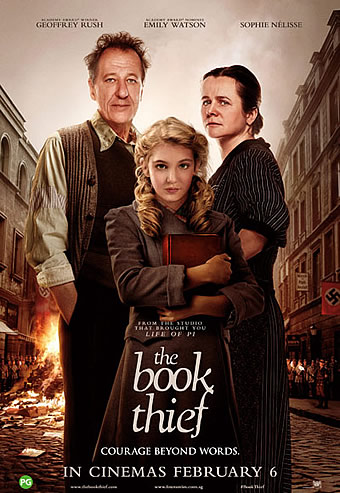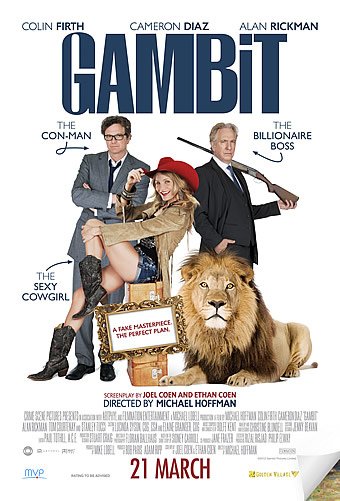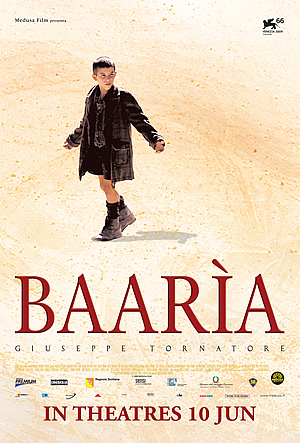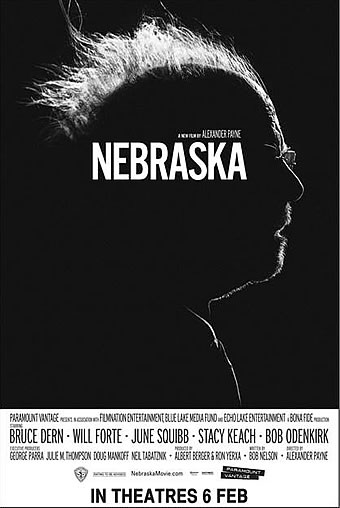THE BEST OFFER (2013)
Genre: Drama/Mystery
Director: Giuseppe Tornatore
Cast: Geoffrey Rush, Jim Sturgess, Sylvia Hoeks, Donald Sutherland, Philip Jackson, Dermot Crowley
RunTime: 2 hrs 11 mins
Rating: M18 (Sexual Scene and Nudity)
Released By: Shaw
Official Website:
Opening Day: 3 April 2014
Synopsis: This is the simple, touching tale of a solitary, cultured man, no longer young, whose reluctance to engage with others is matched only by the dogged obsessiveness with which he practices his profession of art expert and auctioneer. Asked to handle the valuation and sale of a mysterious woman’s priceless heirlooms, the antiques dealer finds himself enveloped by a passion that will transform his grey existence forever. It can be explained as a film about art, seen as the sublimation of love, but also as a film about love, seen as the product of art.
Movie Review:
Giuseppe Tornatore offers up his first English-language feature in the form of an uneven but mesmerising romantic thriller set in the elegant world of high-end antique art dealers. Set in a place that is never named but has hints of the Italian cities of Fidenza, Milan and Bolzano, the Tornatore written-and-directed feature builds itself around the cold-hearted art auctioneer Virgil Oldman, whose run-in with a reclusive heiress Claire Ibbetson (Sylvia Hoeks) whom insists that he be the one to evaluate and auction off her family estate becomes an obsession that turns his perfectly manicured life upside down.
As one quickly discovers, the pleasure in watching ‘The Best Offer’ lies in the tense and suspenseful way in which it unfolds. Indeed, you’ll never really quite know just where it is headed, in part because Tornatore refuses to let the narrative be hemmed in by convention; instead, he delights in keeping his audience on tenterhooks not knowing what to expect, in particular Claire’s motivation for engaging Virgil’s services in the very first place. There is mystery all right, and a distinct sense of discovery as things develop that keep you glued to every little detail on screen.
But first things first, Tornatore starts off with an intimate character study of Virgil. Played excellently by Australian actor Geoffrey Rush, Virgil turns out quite the engrossing character in himself. Cranky and pompous, he dyes his hair black and has a whole cupboard of gloves which he religiously puts on when conducting valuations or auctions. On most days, he shows no emotion and interacts with no one, preferring to spend his time at home staring at the dozens of women’s portraits hanging on the walls of his private vault. Though he never acknowledges it, there is hardly any doubt that his imperious attitude towards employees and clients indicates an abject loneliness inside.
Virgil’s closeted world is transformed when he meets Claire, whom he is at first irritated with for insisting to communicate only via phone and behind the walls of her sprawling mansion. Yet at the same time, he is also intrigued by the mercurial Claire, whose “very strange illness” which keeps her locked at home turns out to be no more than a case of agoraphobia. In the meantime, Virgil is also drawn to the bits of gear he picks up at her home, bringing them to his repairman pal Robert (Jim Sturgess) in the hopes of piecing together some long lost piece of antique machinery.
As he goes back and forth between Virgil’s relationship with Claire and Virgil’s interactions with Robert, Tornatore drops hints that the two might be related to a much greater extent, the surest confirmation of that when Robert’s girlfriend makes an unannounced visit to Virgil to warn him not to trust Robert. The constant talk of art and forgery is yet another definite sign that something is not quite as it seems, culminating in a late third-act twist that pretty much confirms our worst suspicions of just what Virgil has gotten himself into.
To reveal anything more would indeed be spoiling the surprise lying in wait at the end of some superbly mounted old-school tension, which relies on plenty of Old World atmospherics to draw its audience in. This is filmmaking of a certain elegance not usually seen in today’s motion pictures, with Tornatore making use of traditional but effective storytelling techniques and an evocative score from composer Ennio Morricone to recreate a distinct sense of mood and place.
In the midst of all that is Rush, whose emotionally grounded performance is the reason why Tornatore’s film never veers off into camp. With sarcasm and a professional veneer, he conveys the supercilious nature of his character, but in scenes with Dutch actress Sylvia Hoeks, lets enough tenderness seep through such that we have no doubt that the man is lonely and in love with the younger and strangely beautiful woman. Rush’s fascination with Claire never hits a false note, and thoroughly convinces just how deep and how completely someone of his nature could fall in love.
Those who are familiar with Tornatore’s works will also recognise the similarities between Virgil and Philippe Noiret’s Alfredo in ‘Cinema Paradiso’ or Marcello Mastroianni’s Matteo in ‘Everybody’s Fine’. Despite being the first time he is filming in English, ‘The Best Offer’ fits snugly into his body of classic cinema, a gripping exploration of obsession, delusion and alienation from a unique individual’s point of view. It is absorbing stuff, much like staring into a piece of artwork and waiting for it to reveal its underlying secrets to you. Our advice? Take this offer, you’ll find it quite worth the while.
Movie Rating:




(An old-school piece of cinematic work from ‘Cinema Paradiso’s’ Giuseppe Tornatore that rides on genuine suspense to deliver an gripping tale of romance and intrigue)
Review by Gabriel Chong
You might also like:
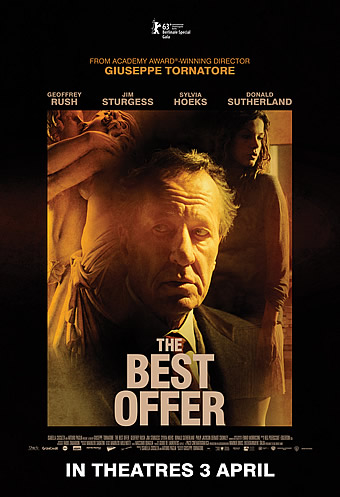
Movie Stills







